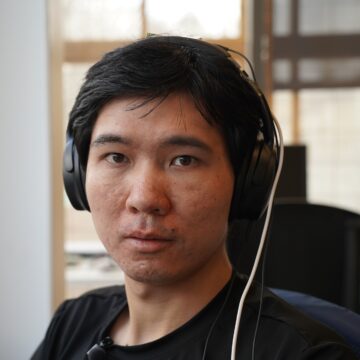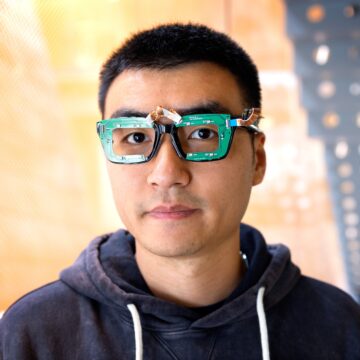Two Doctoral Students Receive Qualcomm Innovation Fellowships
September 9, 2024
By Katya Hrichak
Doctoral student Ke Li and doctoral candidate Ruidong Zhang, both in the field of information science studying under Assistant Professor Cheng Zhang in the Smart Computer Interfaces for Future Interactions (SciFi) Lab, won 2024 Qualcomm Innovation Fellowships (QIF).
Li and Zhang comprised one of 16 winning teams for the QIF North America program, selected from 55 finalist teams out of a pool of 271 abstract submissions after presenting a proposal for their project, “Communication for People with Impairments Using AI-powered Synthesis on Intelligent Wearables.”

With their project, Li and Zhang aim to pair AI-powered speech synthesis with a modified eyeglasses frame to give voices to individuals who have lost the ability to speak, such as those who have had their vocal cords removed through laryngectomies.
“Traditional solutions usually involve painful surgical procedures, while only being able to recover limited voices that are coarse or machine-like,” said Zhang. “In this project, we aim to develop a pair of normal-looking eyeglasses to generate high-quality voices without invasive procedures.”
Miniature speakers and microphones will be added to the eyeglasses frame, functioning as sonar on the speaker’s face to capture facial movements during speech that will then be synthesized by generative models.
“This project aims to combine the power of novel sensing and AI for the social good to bring voice back to people in need,” Zhang said.
Qualcomm awards $50,000 per winner to the student’s university academic department to fund research expenses during the program year.

“Winning this fellowship is a great honor for me, as it signifies the recognition of the importance of our research. It highlights the potential of our proposed systems to be effectively deployed in real-world settings and to assist those in urgent need,” said Li.
In addition to the monetary award, fellowship winners have the opportunity to work with mentors provided by Qualcomm and can participate in collaborative activities or internships with Qualcomm Research.
“Receiving support and advice from experts with diverse perspectives will be invaluable,” Li said. “Along with this fellowship, we will benefit from the guidance of our assigned Qualcomm mentor, whose industry experience and resources will be crucial in helping us develop deployable hardware prototypes and evaluate our system with patients.”
The QIF program focuses on recognizing, rewarding, and mentoring graduate students across a range of technical research as it relates to Qualcomm’s core values of innovation, execution, and teamwork.
Related:
